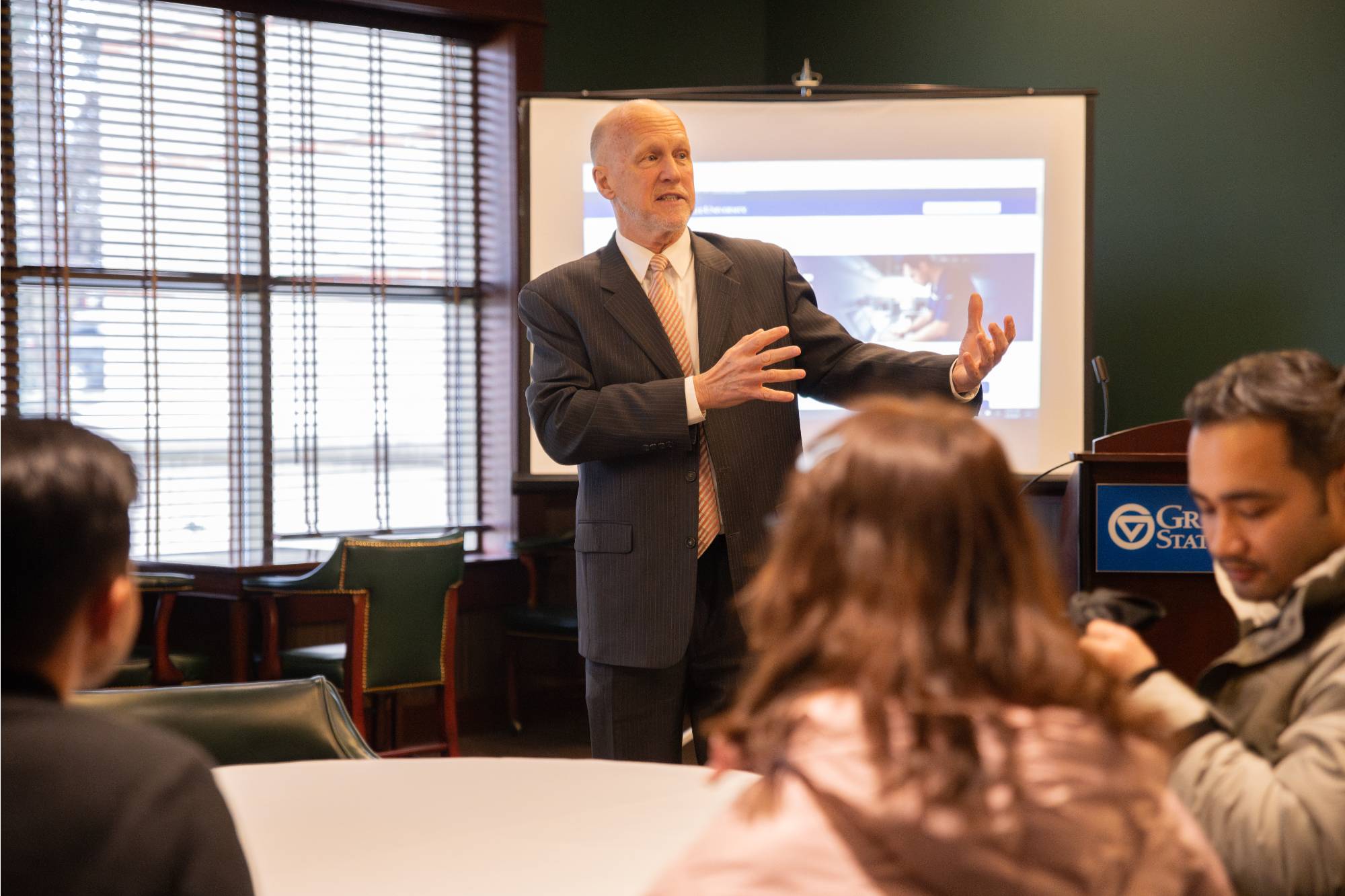Academics
Grand Valleys liberal education focus fosters critical thinking, creative problem-solving and cultural understanding and prepares students for life in a fast-changing world.
On this page:

Free tutoring is available at the Tutoring Center in room 201 of Kleiner Commons. The Tutoring Center seeks to facilitate students' academic progress and to develop self-directed, independent learners. To accomplish this goal, the Tutoring Center provides free tutoring to all Grand Valley State University students in most 100- and 200-level courses. Tutorials are conducted in weekly, one-hour sessions in small group settings. Requests for languages are limited to one hour per week per language. All requests for tutoring are submitted online. Engineering, speech, anatomy, biology, languages and several more subjects have tutors available to all students.
The Writing Center is another great resource available to students through the Tutoring Center for help with any of writing projects. The center's well-trained peer consultants will help you brainstorm ideas, organize content, integrate research, polish a draft and correctly document sources. You can schedule an appointment or take advantage of the drop-in hours by simply bringing a draft of your writing to any of the four writing center locations.
Classroom expectations in the United States may be quite different from other countries you are more familiar with. The class environment tends to be less formal in terms of dress and interactions. However, being punctual and arriving to class on time is important. Each class is typically a combination of lectures and discussions where every student is expected to be an active participant throughout the class period. Even during lectures, students should be engaged.
Each GVSU student is assigned an academic advisor. These advisors work specifically with students in particular majors or programs. They are experts at the proper placement and order courses should be taken. Please respond promptly to your advisor and follow their advice. They understand the GVSU Registration system and work to make sure you get the best courses possible for your situation.
You should plan to meet with your academic advisor at least once per semester to discuss class requirements and plan for upcoming semesters. If you are unsure who your academic advisor is, you can easily access this information on myBanner under Student Records in the Student tab. While working with your advisor and scheduling classes, keep in mind that there are General Education classes that you may need to complete, depending on your program and major. More information about advising can be found here.
Every undergraduate student at Grand Valley must complete a variety of writing courses. As an international student, you should decide which writing course, if any of them, will benefit you: English as a Second Language (ESL) 098, Writing (WRT) 098 or Writing (WRT) 150. While there is an online guide that can help you make your decision, it is a good idea to also ask your academic advisor while scheduling your classes which course is right for you.
Grand Valley State University credit is granted for subject examinations offered by the College-Level Examination Program (CLEP). See Grand Valley CLEP Equivalencies to find which CLEP exams can be taken for Grand Valley credit, as well as read Grand Valley's policy on CLEP.
Transcript and Credits Transfers: If you are an incoming transfer student, you must meet the same academic requirements as all Grand Valley students. In order to have credits transfer to Grand Valley, you must submit course syllabi in English with a description of all courses. It is also helpful to submit coursework so professors can see that the work involved was to the level that they expect. All of this information should be submitted to Astin Martin.
Transferring from within the US: In addition to the above information, you must fill out a Transfer Release Form for Grand Valley. You may also have additional transfer forms to complete through the community college or university you are transferring from. This includes a transfer release date that must be submitted to Grand Valley for immigration purposes.
Grand Valley places significant importance on academic honesty. Any ideas or material taken from another source for either written or oral presentation must be fully acknowledged. Offering the work of someone else as one's own is plagiarism. The language or ideas taken from another may range from isolated formulas, sentences, or paragraphs to entire articles copied from books, periodicals, speeches or the writings of other students. The offering of materials assembled or collected by others in the form of projects or collections without acknowledgment also is considered plagiarism. Any student who fails to give credit in written or oral work for the ideas or materials that have been taken from another is guilty of plagiarism (GVSU Student Code: Plagiarism (Section 223.01)). If you have any questions about writing papers, citing sources or using papers from a different class, be sure to talk to your professor and/or the writing center. Plagiarism is the number one problem international students face because the idea of intellectual property tends to be a new concept to most international students. For more information on how to prevent plagiarism, please visit the Grand Valley Academic Integrity website. Also, hear Grand Valley professors discuss what it means to plagiarize and how you can prevent it by watching this short, informational video.
There are various assistive technologies that can make life in the classroom easier for you. We encourage the use of these devices to help you make the most of your classes here at Grand Valley. There is a list of assistive technologies available on campus, as well as a list of what some of these are used for.
Research assistance is available to all students through the Peer Research Assistant Program. Consultants work one-to-one or in small groups in campus libraries to help other students refine their topics; develop research plans; find books, articles and other sources of information; evaluate those resources; and talk through the entire process of doing library research to complete an assignment.

